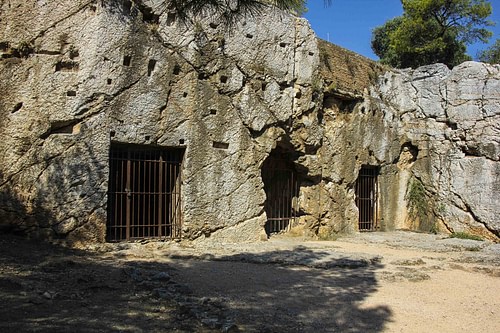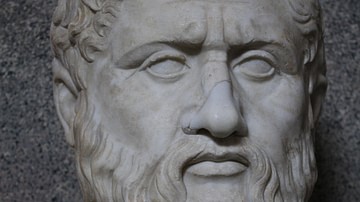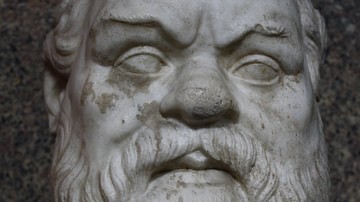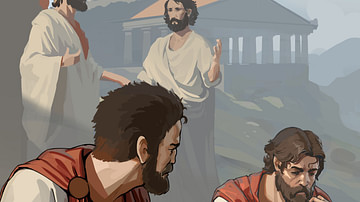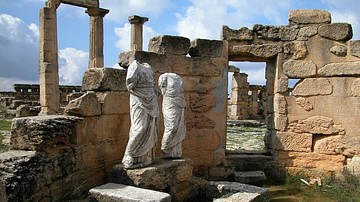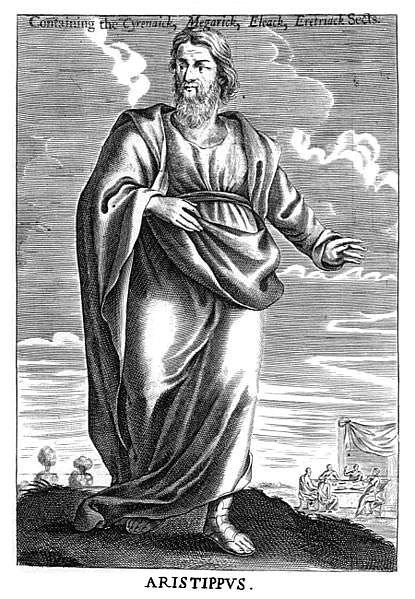
Aristippus of Cyrene (l. c. 435-356 BCE) was a hedonistic Greek philosopher who was one of Socrates' students and founder of the Cyrenaic School of philosophy which taught that pleasure and the pursuit of pleasure was the highest good and noblest path one could dedicate one's self to.
He studied under Socrates (l. c. 470/469 - 399 BCE) along with other pupils such as Plato (l. c. 424/423 - 348/347 BCE), Xenophon (l. 430 - c. 354 BCE), Antisthenes of Athens (l. c. 445 - 365 BCE), and Phaedo of Elis (l. c. 4th century BCE). Aristippus was the first of Socrates' students to charge a fee for teaching and, since Socrates had charged nothing, this, and the accusation he had betrayed Socrates' philosophy, created a life-long friction between Aristippus and Socrates' other disciples.
Since he believed and taught that the meaning of life was pleasure, and this was at odds with the focus of the other schools (especially Plato's) he appears to have been something of an outcast among them. It is hard to understand, at first, how Aristippus could have been a student of Socrates, so different seem their philosophies. However, Aristippus' most famous phrase, “I possess, I am not possessed”, is quite in line with Socrates' own view of life as presented by Plato and Xenophon, the two primary sources on Socrates' life. Like Aristippus, Socrates had no problems with enjoying a feast or a party or drinking session but was just as comfortable doing without any of these.
Aristippus' Philosophy
Plato presents Socrates as a man who often enjoyed drinking wine but who never got drunk, who attended parties but never had the money to host one himself, and who seems to have lived primarily - in his later years at least - on monetary gifts from friends and admirers. Xenophon does not contradict Plato on any of the above points. Although Socrates could in no way be considered a hedonist, it is fairly easy to see how a young disciple of his could come to the conclusion that enjoying those things money can buy, without becoming a slave to the money with which to buy such things, would seem a worthwhile philosophy. Further, Socrates' habit of drinking heavily, but never appearing drunk or trying to acquire more wine, would be in line with Aristippus' philosophy of possessing, or enjoying, something without being possessed by that thing.
While Socrates pursued truth and sought understanding, Aristippus simplified the teaching of his master by claiming the highest truth one could attain was the recognition that pleasure was the purpose of human existence and the pursuit of pleasure was the meaning of life. In this, and in his scorn for those who complicated matters by thinking too precisely on them, he would be a kindred spirit of the Chinese hedonist philosopher Yang Zhu (440-360 BCE) who claimed that concerns about "right" and "wrong" were a waste of time because there is no god, no afterlife, and no reward for suffering needlessly by denying oneself when one could as easily, and more sensibly, enjoy life in the present.
Plato's dialogue of the Phaedo describes the last day of Socrates' life when his disciples came to visit him in his prison cell in Athens and they had their final philosophical discussion. The dialogue begins with the Pythagorean philosopher Echecrates meeting Socrates' student Phaedo (who was there at the prison and present at Socrates' death) and asking him to tell of the experience in the jail on the last day. Phaedo lists those who were present and Echecrates asks, “But Aristippus and Cleombrotus, were they present?” To which Phaedo replies, “No. they were not. They were said to be in Aegina” (59c). As the island of Aegina was known as a pleasure resort, Plato certainly knew what he was doing in placing the hedonistic philosopher there instead of in attendance in Socrates' last hours.
Whether the Cleombrotus mentioned in Phaedo is the same man whom Callimachus says leaped to his death after reading Plato's description of the afterlife and the journey of the soul in the dialogue of the Phaedo is not known, but if Cleombrotus was with Aristippus on Aegina, it may safely be assumed they were not there engaged in philosophical discourse, as Plato would have defined it, but would have been pursuing pleasure.
As Plato did not approve of Aristippus (as, it seems, he did not approve of most of Socrates' other disciples nor they of him) the line referencing Aristippus' preference of pleasure on Aegina to philosophical conversation in an Athenian jail cell would have been intended by Plato to show how shallow Aristippus and his philosophy was. The ancient writer Diogenes Laertius (3rd century CE) mentions Plato's jab against Aristippus in Plato's Book on the Soul, as the Phaedo was called.
Even so, Aristippus, like Socrates, focused his attention on practical ethics; the question "What is the Good?" was in the forefront of his belief system. The values humans term "good" or "evil" are reducible to pleasure and pain; self-gratification, then, is a great good while self-restraint, in the face of certain pleasure, would be bad. Still, Aristippus maintained that one should not allow oneself to be possessed by those things which bring pleasure.
According to Diogenes Laertius, when Aristippus was criticized for keeping a very expensive mistress named Lais, he replied, “I have Lais, not she me.” There was nothing at all wrong, then, with enjoying whatever it was one wanted to enjoy, as long as one knew the ultimate value of that thing or person and did not confuse that value with one's own personal freedom. In Aristippus' view, one should never trade one's freedom for anything. Self-restraint and self-gratification, then, were of equal value in maintaining one's personal liberty while pursuing the Good in life: pleasure.
Aristippus at Court
Aristippus lived at the court of the tyrant Dionysius I of Syracuse (r. 432-367 BCE) or, perhaps, of his son Dionysius the Younger (r. 397-343 BCE) where he was highly paid for his teaching and writing. When he first arrived at the palace, Dionysius asked him what he was doing there and, allegedly, he said, "When I wanted wisdom I went to Socrates; but now that I want money I have come to you." The uncertainty of which king Aristippus lived with is due to the primary sources referencing "Dionysius" without clarifying whether the father or the son, and as their personalities were similar, it could be either. Plato had attempted to turn Dionysius the Younger into his Philosopher King and failed and so, if Aristippus served that king, it would further explain Plato's enmity toward Aristippus (even though no further explanation is required than Aristippus' philosophy of pleasure). Diogenes Laertius tells us that
[Aristippus] was a man very quick at adapting himself to every kind of place, and time, and person, and he easily supported every change of fortune. For which reason he was in greater favour with Dionysius than any of the others, as he always made the best of existing circumstances. For he enjoyed what was before him pleasantly, and he did not toil to procure himself the enjoyment of what was not present. (III)
His position at the court was essentially "wise man"' or "counselor" but, according to the ancient reports, he seems to have spent much of his time simply enjoying himself at the expense of Dionysius. Diogenes Laertius illustrates this:
One day he asked Dionysius for some money, who said, "'But you told me that a wise man would never be in want,' 'Give me some,' Aristippus rejoined, 'and then we will discuss that point;' Dionysius gave him some, 'Now then,' said he, 'you see that I do not want money.'" (IV)
He apparently lived very luxuriously at the court where, among his students, he taught his daughter Arete about philosophical hedonism. She, in turn, passed his teaching down to her son, Aristippus-the-Younger (also known as Aristippus-the-mother-taught because he was raised by his mother alone), who formalized the teachings in his own writings. The teachings of Aristippus and his Cyrenaic School would later influence the thought of Epicurus and his philosophy regarding the primacy of pleasure in understanding the ultimate meaning in one's life.
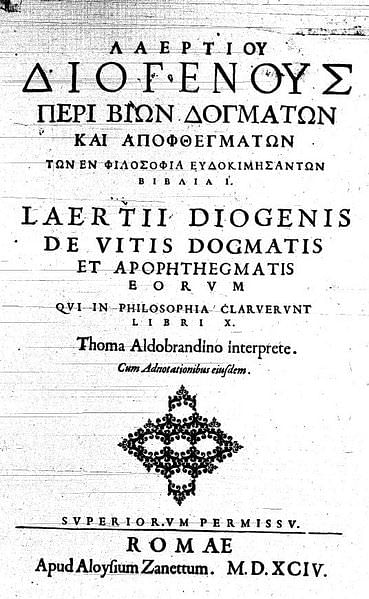
Aristippus' Writing & Later Life
According to some ancient sources, Aristippus wrote many books while, according to others, none. The primary source of anecdotes concerning his life is Diogenes Laertius who has been criticized for not citing his sources but mentions Aristippus' written works in the same passage where he says he wrote nothing. One of the works attributed to him was On Ancient Luxury, no longer extant, which seems to have been a kind of scandal sheet detailing the less philosophical affairs and dalliances of Greek philosophers with young boys (and with particular attention paid to Plato). While it is entirely possible Aristippus could have written such a work, it does not seem consistent with his character. He routinely seems to have regarded himself superior to his contemporaries, especially to Socrates' other students, and it seems unlikely he would have expended the effort to write anything about them at all.
Aristippus lived into old age after a life of luxury and pleasure and retired to his hometown of Cyrene where he died. His daughter and grandson systematized his philosophy, and Aristippus the Younger is thought to have formally founded the Cyrenaic School of Philosophy (one of the earliest so-called Socratic schools originally founded by Aristippus himself) based on his grandfather's teachings. Later Cyrenaics would develop Aristippus' vision further but, ultimately, it was overshadowed and then replaced by that of Epicurus which was more comprehensive.
